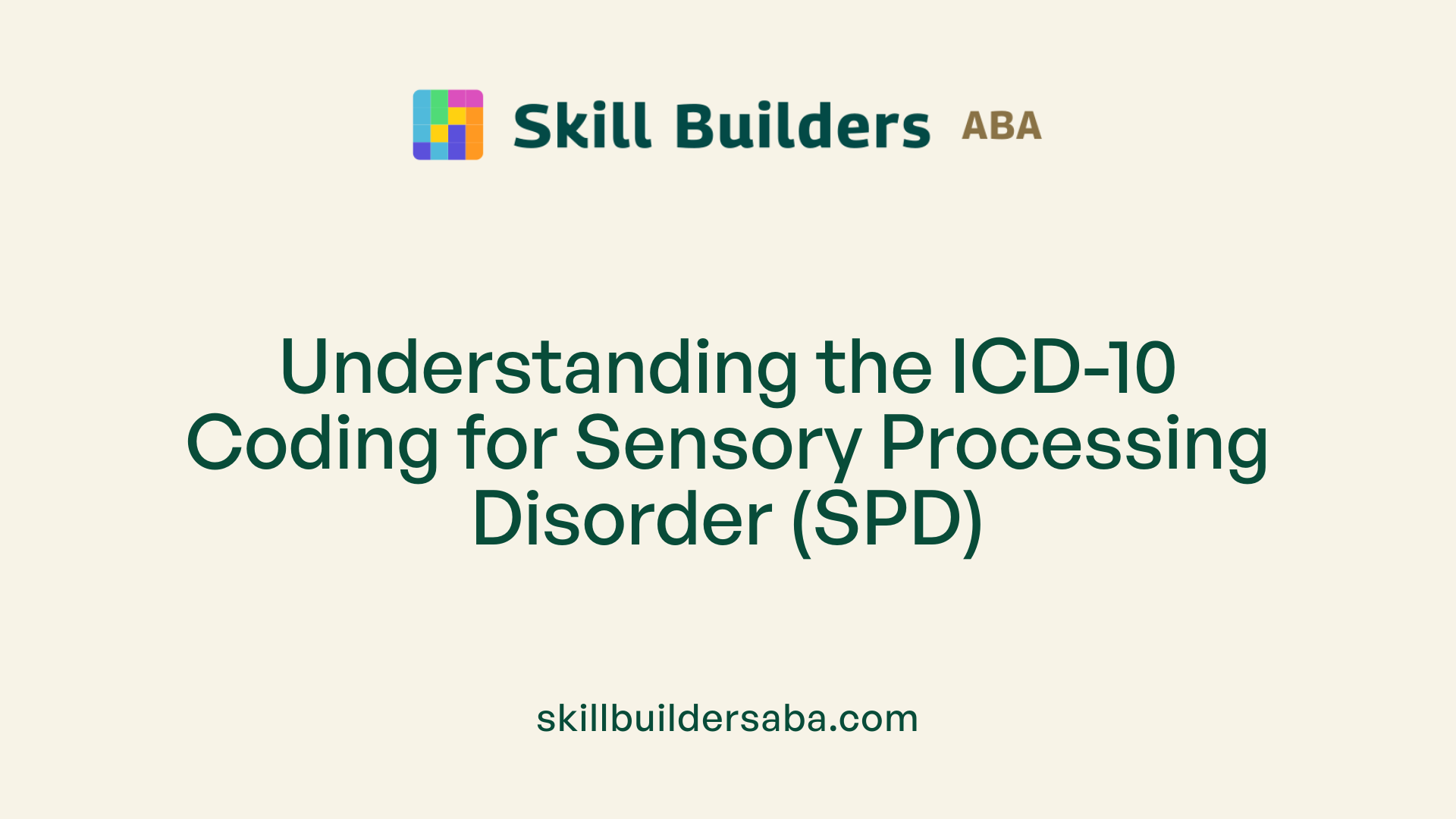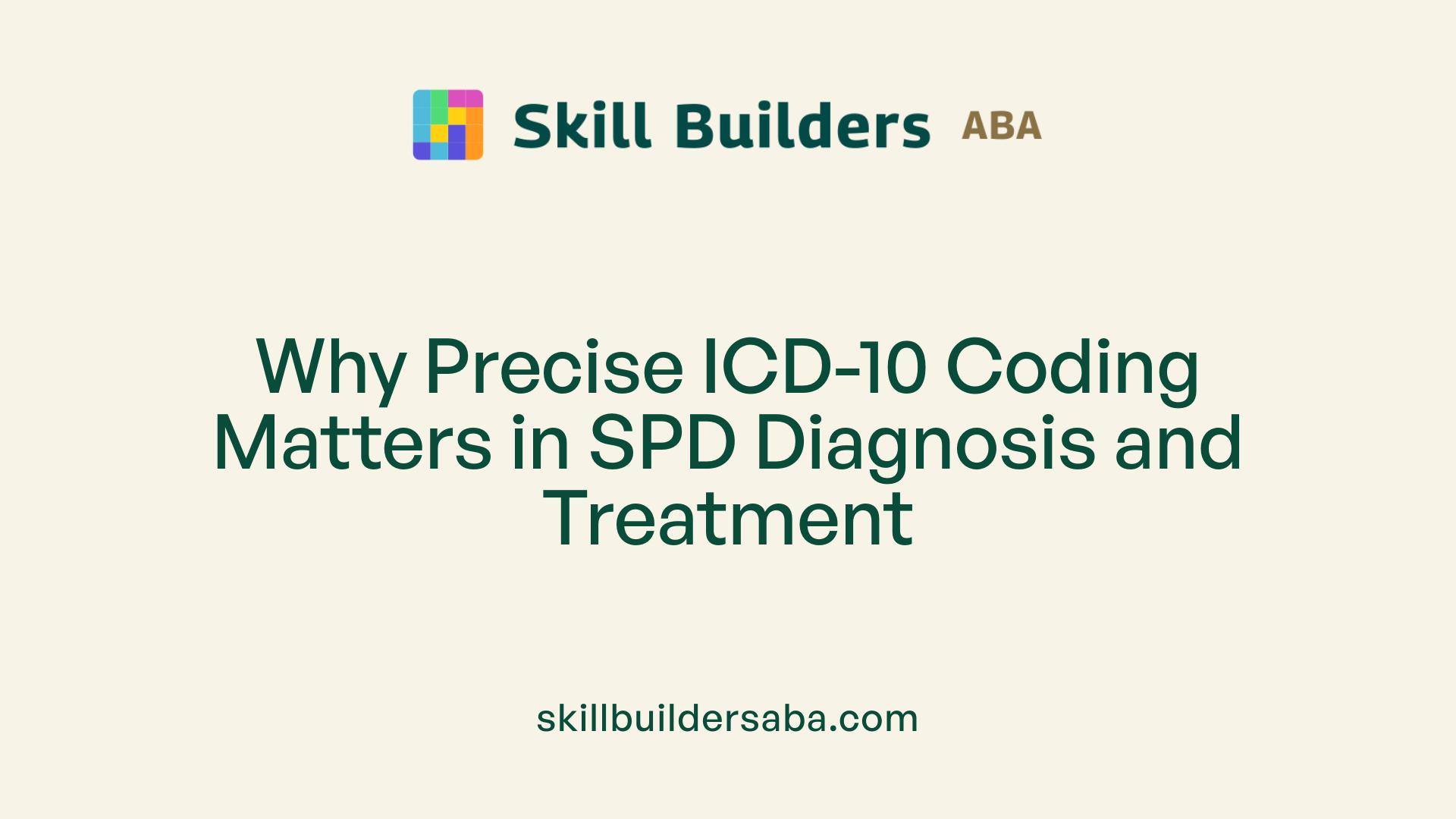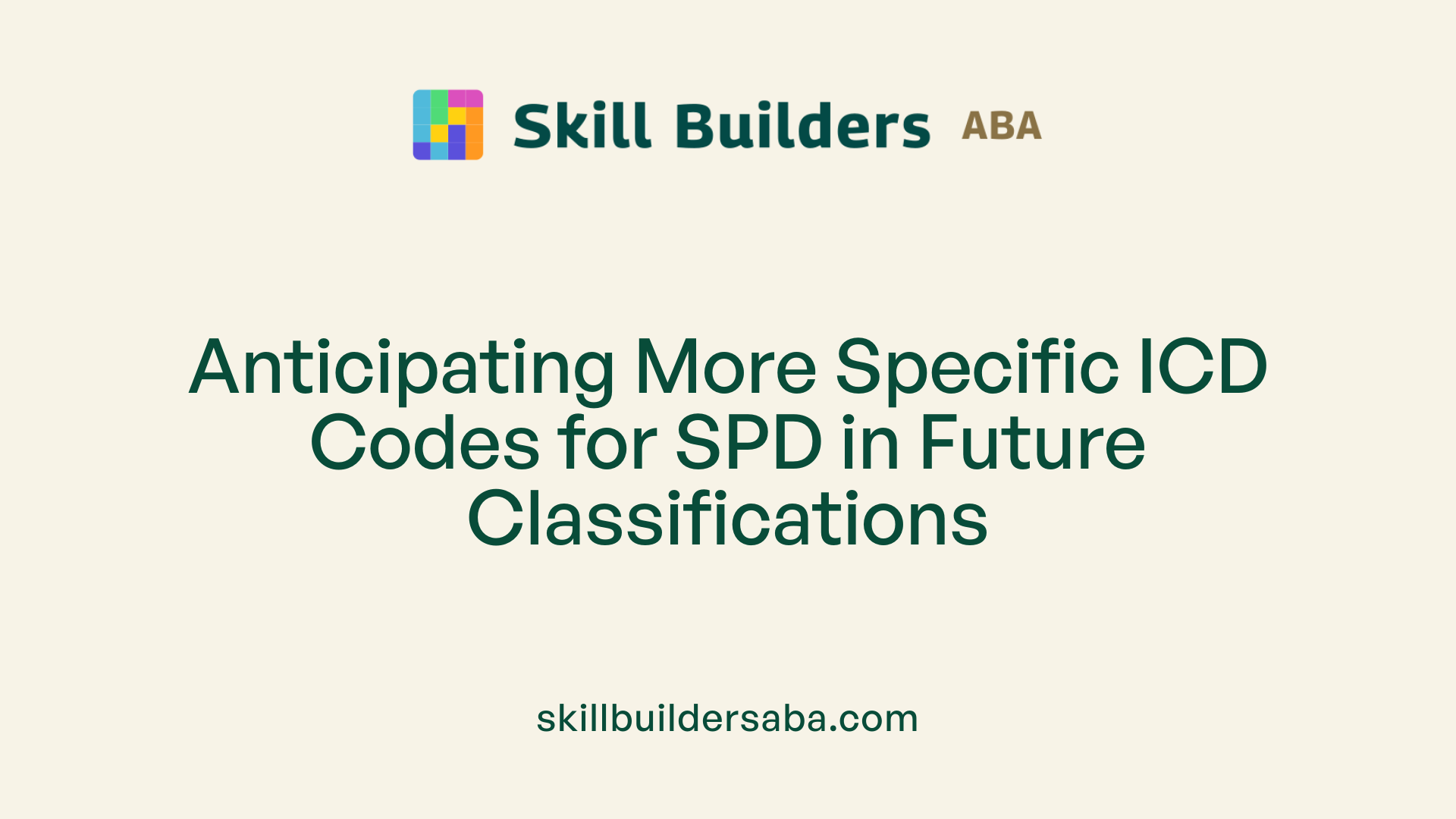
What is the Sensory Processing Disorder ICD-10 Code?
Understanding the Classification of Sensory Processing Disorder in Medical Coding
An Overview of ICD-10 Codes for SPD
Sensory Processing Disorder (SPD) is a condition affecting how individuals perceive and respond to sensory stimuli. In the realm of medical diagnosis and documentation, accurate coding using systems like ICD-10 is essential for effective treatment, billing, and research. This article explores how SPD is represented within the ICD-10 classification system, highlighting the codes used, their significance, and future prospects for formal recognition.
The Current ICD-10 Codes Associated with SPD

What is the ICD-10 code for Sensory Processing Disorder (SPD)?
There is no specific ICD-10 code solely designated for Sensory Processing Disorder (SPD). Clinicians often use code F88, which covers other disorders of psychological development, including those involving sensory integration issues. Alternatively, some may assign F84.0, which encompasses pervasive developmental disorders characterized by atypical sensory responses. In cases where SPD is associated with broader neurodevelopmental conditions, codes like F84.9 or F82 (developmental coordination disorder) might be used as well. Overall, the diagnosis is generally coded under F88 or F84.0, but exact coding may vary based on the clinician’s judgment and documentation.
How is Sensory Processing Disorder coded within the ICD-10 system?
SPD is generally coded under ICD-10 code F88, which pertains to other disorders of psychological development, including sensory processing and integration disorders.
What does the ICD-10 classification say about Sensory Processing Disorder?
Currently, Sensory Processing Disorder (SPD) is not recognized as a distinct diagnosis in the ICD-10 classification. However, clinicians often use the code F88, which covers "Other Disorders of Psychological Development," to document symptoms associated with SPD, including sensory integration issues. Additionally, the code F84.9, for unspecified Pervasive Developmental Disorder, may also be utilized when SPD symptoms are present in the context of broader developmental concerns. The classification acknowledges specific subtypes like Sensory Over-Responsivity and Under-Responsivity as part of the broader category of neurodevelopmental disorders. Overall, while SPD does not have its own unique ICD-10 code, it is generally included within categories addressing developmental and sensory integration difficulties.
How important is accurate ICD-10 coding for the diagnosis and treatment of SPD?
Accurate ICD-10 coding is essential for the diagnosis and treatment of individuals with Sensory Processing Disorder (SPD), even though SPD itself may not have a specific standalone code. Precise coding relies on detailed clinical documentation that captures aspects such as severity, laterality, and onset, which enhances the quality of patient records. Proper coding supports effective treatment planning, improves communication among healthcare providers, and ensures reimbursement accuracy, thereby promoting better patient safety and outcomes. Additionally, accurate ICD-10 coding facilitates data collection for assessing treatment effectiveness and informing healthcare policies. Overall, meticulous coding practices are vital for ensuring comprehensive care, compliance, and optimal resource utilization in managing SPD.
Is Sensory Processing Disorder included in ICD-11?
Sensory Processing Disorder (SPD) is not formally recognized as a distinct diagnostic category in ICD-11, similar to ICD-10. Instead, related symptoms or sensory processing issues may be coded under broader categories such as developmental or neurological disorders. SPD involves disruptions in the perception and response to sensory stimuli across multiple senses and is often associated with neurodevelopmental conditions like Autism Spectrum Disorder and ADHD. It is typically diagnosed by occupational therapists or specialists based on observed symptoms, rather than through a specific ICD-11 code. Overall, while sensory processing difficulties are acknowledged in clinical practice, SPD itself is not officially included as a standalone disorder in the ICD-11 classification system.
Additional relevant codes for SPD include:
| ICD-10 Code | Description | Usage Context | Effective Date |
|---|---|---|---|
| F88 | Other disorders of psychological development, including sensory integration issues | Used as a general code for various developmental and sensory processing issues | As part of ICD-10, ongoing |
| F84.0 | Pervasive developmental disorder, including autism spectrum disorder | Applied in cases with sensory processing symptoms within broader developmental diagnoses | Current, but subject to updates |
| F84.9 | Unspecified pervasive developmental disorder | For cases where specific diagnosis details are unavailable or unspecified | Ongoing |
| F82 | Developmental coordination disorder (dyspraxia) | When SPD-related motor coordination issues are present | Ongoing |
| R20.3 | Hyperesthesia (increased sensory sensitivity) | When children exhibit heightened sensitivity to stimuli | From October 2024 |
| R44.8 | Symptoms involving perception and sensations | For transient, provisional, or unspecified symptoms that cannot be classified more specifically | From October 2024 |
Why proper coding and documentation matter
Using the correct ICD-10 codes for sensory processing and related disorders ensures that healthcare providers can accurately document clinical presentations. This accuracy is vital for effective treatment, insurance reimbursement, and statistical data collection. It also helps in future research efforts aimed at better understanding and classifying SPD. While there is no dedicated ICD-10 code for SPD, using the appropriate related codes like F88 and F84.0 ensures that symptoms are recognized and managed within the current classification system. This ongoing refinement in coding supports advocacy for normative inclusion of SPD as a distinct diagnosis in future revisions of ICD, such as ICD-11 or subsequent updates.
The Significance of Accurate Coding in Medical Practice

Role of ICD-10 codes in treatment planning and reimbursement
Accurate ICD-10 coding is essential for effective treatment planning. For sensory processing disorder (SPD) and related neurodevelopmental issues, specific codes such as F84.0 help clinicians document the diagnosis clearly. Since there is currently no ICD-10 code exclusively for SPD, codes like F88 (other disorders of psychological development) are used as approximate identifiers. This ensures that providers can justify treatment charges and receive proper reimbursement for therapies addressing sensory processing difficulties.
Impact on research and prevalence data collection
Proper coding also plays a vital role in data collection and epidemiological research. Codes like F84.9, which covers unspecified pervasive developmental disorders, facilitate the gathering of prevalence information. Although SPD lacks its own dedicated ICD-10 code, the inclusion of related codes enables researchers to monitor trends, identify affected populations, and advocate for future classification updates, such as in the upcoming ICD-11.
Importance for healthcare providers and policy makers
For healthcare professionals, precise documentation supports continuity of care and accurate clinical records. Policy makers rely on reliable data derived from coded diagnoses to allocate resources and develop policies. The transition towards more specific codes like F84.0 for SPD in the ICD-11 aims to improve diagnostic clarity, which could lead to better awareness, targeted interventions, and policy support for individuals with sensory processing challenges.
Future Perspectives: ICD and Sensory Processing Disorder
 The upcoming updates to the International Classification of Diseases (ICD) promise to improve how sensory processing disorder (SPD) is recognized and diagnosed. Since ICD-11 was released in June 2018 and began adoption by member states in 2022, there is hope that SPD will receive a dedicated category in future classifications.
The upcoming updates to the International Classification of Diseases (ICD) promise to improve how sensory processing disorder (SPD) is recognized and diagnosed. Since ICD-11 was released in June 2018 and began adoption by member states in 2022, there is hope that SPD will receive a dedicated category in future classifications.
Currently, SPD is broadly categorized under neurodevelopmental disorders and linked to codes like F84.0 in ICD-10, which explicitly labels sensory processing issues. However, as research progresses, there is a strong possibility that new, more specific codes will be introduced in subsequent ICD updates.
The evolution of neurodevelopmental disorder classification aims to better reflect individual conditions like SPD, allowing for more precise diagnoses. This can lead to earlier intervention, targeted therapies, and improved understanding across healthcare and research communities.
Updated ICD codes are expected to impact clinical practice by simplifying diagnosis, improving billing accuracy, and encouraging the development of specialized treatment programs. Moreover, clearer classification will enhance data collection, helping policymakers allocate resources and plan support systems for individuals with sensory processing challenges.
Understanding the Broader Context of Sensory and Developmental Disorders
 Sensory Processing Disorder (SPD) is part of a wider group of neurodevelopmental conditions that include autism spectrum disorder (ASD) and attention-deficit/hyperactivity disorder (ADHD). These conditions often share overlapping symptoms, such as difficulties in sensory integration and behavioral challenges.
Sensory Processing Disorder (SPD) is part of a wider group of neurodevelopmental conditions that include autism spectrum disorder (ASD) and attention-deficit/hyperactivity disorder (ADHD). These conditions often share overlapping symptoms, such as difficulties in sensory integration and behavioral challenges.
Proper classification of SPD influences the availability of support services and treatment options. Currently, there is no specific ICD-10 code for SPD, but related codes like F84.0 (for neurodevelopmental disorders including sensory issues) and F88 (for other developmental disorders) facilitate medical documentation and insurance reimbursements.
Healthcare professionals play a vital role in diagnosing these conditions accurately. They use available ICD-10 codes to document symptoms, which informs treatment plans and supports research. Proper coding enhances data collection and can lead to the development of more precise future classifications. This approach ultimately aims to improve understanding and support for children with sensory processing difficulties.
The Role of ICD in Supporting Individuals with SPD
While Sensory Processing Disorder (SPD) does not yet have its own specific ICD-10 code, the use of broader classification codes such as F88 and F84.0 helps clinicians document and manage the condition effectively. Accurate coding is crucial for treatment planning, reimbursement, and advancing research. As the international classification system evolves, there is hope for more precise recognition of SPD as a distinct disorder. In the meantime, comprehensive clinical documentation and appropriate coding practices remain vital for supporting individuals with sensory processing difficulties, ensuring they receive the care and resources they need.
References
- What is the Sensory Processing Disorder ICD-10 Code?
- Sensory processing disorder - TheraPlatform
- 2025 ICD-10-CM Diagnosis Code R44.8
- What is the Sensory Processing Disorder ICD-10 Code?
- What is the Sensory Processing Disorder ICD-10 Code?
- Crosswalk from DC:0-5™ to DSM-5 and ICD-10 - Zero to Three
- Sensory processing disorder - TheraPlatform
- Crosswalk from DC:0-5™ to DSM-5 and ICD-10 - Zero to Three
Learn at Your Own Pace
We invite you to learn more about our therapy philosophy and services online. Whenever you feel ready to discuss your child's specific needs, get in touch with our intake team.
.svg)